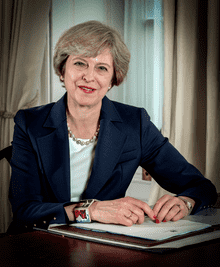 As of today, 7 June 2019, Theresa May has officially stepped down as Conservative leader and Prime Minister of the United Kingdom. In the wake of rejected Brexit deals, the humiliation of no-confidence votes and a loss of party support, May’s time as leader is at an end while the turmoil of Brexit continues. As the Conservatives face the daunting task of electing a new leader, there is little doubt that there could be difficult times ahead for both investors and the British Pound itself.
As of today, 7 June 2019, Theresa May has officially stepped down as Conservative leader and Prime Minister of the United Kingdom. In the wake of rejected Brexit deals, the humiliation of no-confidence votes and a loss of party support, May’s time as leader is at an end while the turmoil of Brexit continues. As the Conservatives face the daunting task of electing a new leader, there is little doubt that there could be difficult times ahead for both investors and the British Pound itself.
The end of a difficult era
May delivered an emotional resignation speech outside of 10 Downing Street on the 24 May, whereby she stated that ‘it was in the best interests of the country’ for a new leader to navigate the Brexit minefield. The markets responded immediately, with the Pound falling to 1.26 against the Dollar and to a mere 1.13 against the Euro – the lowest since January this year.
Speculation about the Tory premier’s eventual departure saw the currency struggling massively during the month of May – its worst since 2016. While the markets did make a mild recovery following her announcement, it is likely that the health of both the Pound and stocks exposed to the UK economy will depend on May’s successor.
Who will be next?
The leadership race has already begun, with a total of twelve MPs having put themselves forward as candidates for PM before parliament’s summer recess. There are several favourites among the crowded list, including former foreign secretary Boris Johnson, former Brexit secretary Dominic Raab, Home Secretary Sajid Javid and lastly, Secretary State of Environment, Food and Rural Affairs Michael Gove.
A recent survey conducted by YouGov for the Times revealed that 39% of Conservative members had a preference for Johnson, followed by Raab at 13% and Javid and Gove in joint third place with 9%. While Johnson may well appear to be in the lead thus far, there is no guarantee that this pattern will continue with such a vast array of candidates to choose from. Speculation is rife, which is likely to cause instability in the markets as traders await a new Brexit direction.
How will the Pound Sterling fare?
In general, each of the twelve contenders are in favour of a harder Brexit, with Boris Johnson seated comfortably at the more severe end of the spectrum. Should the initial polls prove to be an accurate indicator of sentiment and Johnson does eventually take power, then investors should consider the possibility of a no-deal Brexit passing through parliament.
Union Bank of Switzerland (UBS) are of the opinion that a no-deal Brexit could see the Pound falling as much as 10% against the Dollar.
With so much uncertainty ahead, the Pound may well drift aimlessly until a fresh resolution is reached. Thanks to this, the currency is likely to experience volatility as traders mull over the leadership race, increasing support for the Brexit Party, and the possibility of a no-deal Brexit.
Disclaimer: This written/visual material is comprised of personal opinions and ideas. The content should not be construed as containing any type of investment advice and/or a solicitation for any transactions. It does not imply an obligation to purchase investment services, nor does it guarantee or predict future performance. FXTM, its affiliates, agents, directors, officers or employees do not guarantee the accuracy, validity, timeliness or completeness of any information or data made available and assume no liability for any loss arising from any investment based on the same.
Risk Warning: There is a high level of risk involved with trading leveraged products such as forex and CFDs. CFDs are complex instruments and come with a high risk of losing money rapidly due to leverage. 90% of retail investor accounts lose money when trading CFDs with this provider. You should consider whether you understand how CFDs work and whether you can afford to take the high risk of losing your money.
